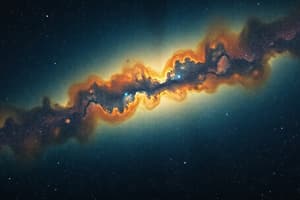Podcast
Questions and Answers
What is the primary component of the nebula cloud from which the sun and planets were formed?
What is the primary component of the nebula cloud from which the sun and planets were formed?
- Helium and hydrogen (correct)
- Oxygen and phosphorus
- Carbon and nitrogen
- Iron and silicon
Why did heavier elements move away from the center during the formation of the sun?
Why did heavier elements move away from the center during the formation of the sun?
- They were expelled by the sun's gravity
- Lighter elements moved to the center (correct)
- They collided with other stars
- They were destroyed in the fusion reaction
Which of the following elements is NOT mentioned as a heavier element moving away from the center?
Which of the following elements is NOT mentioned as a heavier element moving away from the center?
- Silicon
- Carbon
- Copper (correct)
- Oxygen
What was the main process through which planets were formed according to the nebula hypothesis?
What was the main process through which planets were formed according to the nebula hypothesis?
What type of star is the sun in comparison to other stars in the universe?
What type of star is the sun in comparison to other stars in the universe?
What causes the fusion reaction that generates energy in the sun?
What causes the fusion reaction that generates energy in the sun?
How old are most stars in relation to the age of planets?
How old are most stars in relation to the age of planets?
What shapes were formed as the heavier elements started clustering during the planet formation process?
What shapes were formed as the heavier elements started clustering during the planet formation process?
Study Notes
Formation of Celestial Bodies
- All celestial bodies, including the sun, planets, stars, and asteroids, originated from a nebula cloud.
- Stars predate the formation of planets and asteroids.
Age of Celestial Objects
- Planets are approximately 4.5 billion years old.
- Most stars exist within a lifespan of 1 billion to 10 billion years.
- The sun is the largest star in the universe.
Nebula Cloud Composition
- The nebula cloud consists mainly of helium, hydrogen, and dust particles.
- Heavy rotation of the nebula caused hydrogen and helium to concentrate at the center.
Sun Formation Process
- Collisions and friction among particles in the nebula led to nuclear fusion.
- The fusion reactions generated immense energy, resulting in the formation of the sun.
Distribution of Elements
- Lighter elements (hydrogen and helium) migrated to the center, forming the sun.
- Heavier elements (carbon, oxygen, nitrogen, iron, phosphorus, silicon) moved outward, away from the center.
Planetary Formation
- Earth and other planets are composed of denser elements than stars.
- Heavier elements began to clump together, forming smaller nebulas.
- Further rotation, friction, and collisions in these smaller clouds led to the creation of a disc-shaped cloud.
Accretion Process
- Planets formed through the process of accretion as heavier elements continued to gather in the center.
- Layered formation of planets occurred as the denser elements aggregated over time.
Nebula Hypothesis
- This model of origin and formation of celestial bodies is known as the nebula hypothesis.
Studying That Suits You
Use AI to generate personalized quizzes and flashcards to suit your learning preferences.
Description
Explore the fascinating processes of how stars, planets, and asteroids are formed from nebula clouds. This quiz covers the age of celestial bodies, highlighting the relationship between stars and the formation of our solar system. Test your knowledge on the origins of the universe and the lifecycle of stars.




